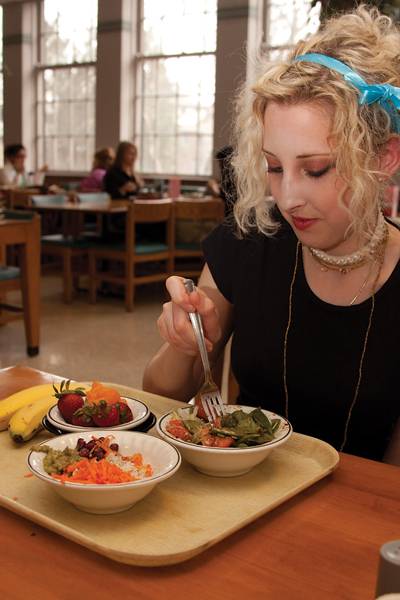Students go vegetarian and vegan for health benefits

Anne Null, freshman in art and design, enjoys a vegan meal Wednesday. Vegans traditionally eschew meat and any products produced by an animal, like eggs, cheese and leather. Photo: Elena Noll/Iowa State Daily
April 2, 2009
Anne Null, freshman in art and design, has been a vegan for two years.
A vegan is a person who does not eat or use any animal byproducts. That means no meat, eggs, dairy, or leather. A vegetarian, on the other hand, is a person who simply does not eat meat.
“It is inspiring to think that one individual’s seemingly insignificant choice can make a positive impact on the life of another, human or non,” Null said.
Many people are moving towards a more “green” diet by adding green leafy vegetables and taking away meats.
Judy Trumpy, a registered dietician for Thielen Student Health Center, said it is common to have students come in and ask about the vegetarian and vegan lifestyle.
“Keep track of what you eat for four to five days and compare it to the food guide pyramid,” Trumpy said.
Trumpy mentioned a tool for those interested in looking at the health characteristics of food served on campus. The program is called netnutrition, and provides a health summary of all food served at any venue on campus.
This tool comes in handy for vegetarians and vegans because of the filters it has available. Students are given the option to cut out food that they cannot have: meat, gluten, eggs, etc.
“The dining staff has been extremely gracious in helping vegetarians with numerous meatless dishes. The difficulty comes in when vegans are thrown into the mix,” Null said.
Although students are becoming more aware of what they are eating all-around, the vegetarian and vegan lifestyle boasts serious health benefits.
Audrey Dingeman, senior in animal ecology, quoted John Robbins’ “Diet for a New America” saying that by not consuming meat, dairy products and eggs, one could reduce their risk of a heart attack by 45 percent.
Physical health benefits are only one argument that herbivores use as to why they choose this lifestyle.
“I feel happier since having become vegan,” Null said.
Some vegetarians and vegans argue that this lifestyle is actually better for the environment.
“It’s an affirmation of how much power each of us holds to make the changes we desire to see in the world,” Null said.
Others enjoy the omnivorous lifestyle, eating both meat and plants, and think it would be extremely difficult to uphold the rules of being a vegetarian or vegan.
“I enjoy meat and I think it would be too difficult and demanding to be a vegetarian,” said Kyle Longnecker, sophomore in mechanical engineering.
Although opinions differ greatly on whether or not to eat meat, omnivores and herbivores generally coexist peacefully.
If anything does improve, Null said, she wants people to stop associating PETA, People for the Ethical Treatment of Animals, with the vegetarian and vegan lifestyle.
“Think of PETA as the annoying kid in class who won’t shut up and is constantly creating chaos for narcissistic attention. Unlike the class clown, this kid only makes people angry,” Null said.
Trumpy’s advice to students interested in the vegetarian or vegan lifestyle is to watch your vitamin D levels, as those generally drop for vegans. Trumpy also advised taking a multi-vitamin to ensure the adequate nutrients are present in your system..
“Try to eat from all the food groups,” Trumpy said.
Committing to the vegetarian or vegan lifestyle is a definitely a significant change. However, many have found this lifestyle rewarding with the various health benefits that it offers.
“I wish I had gone vegan sooner,” Null said.
















